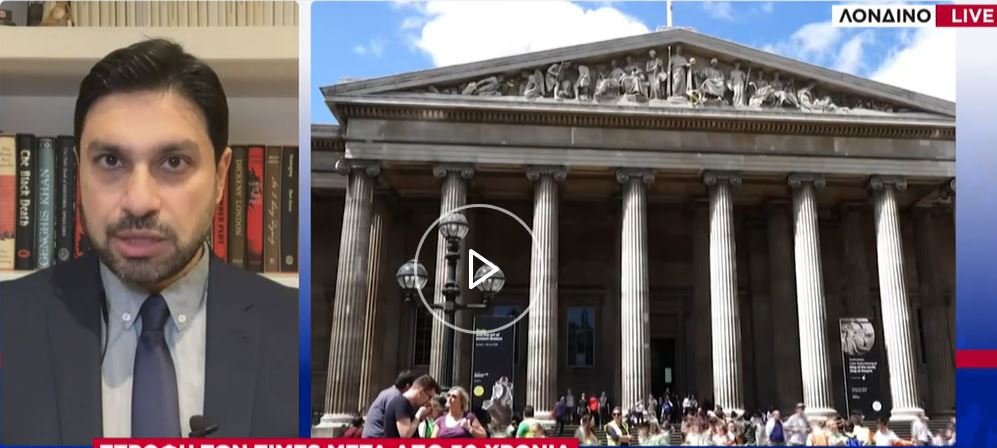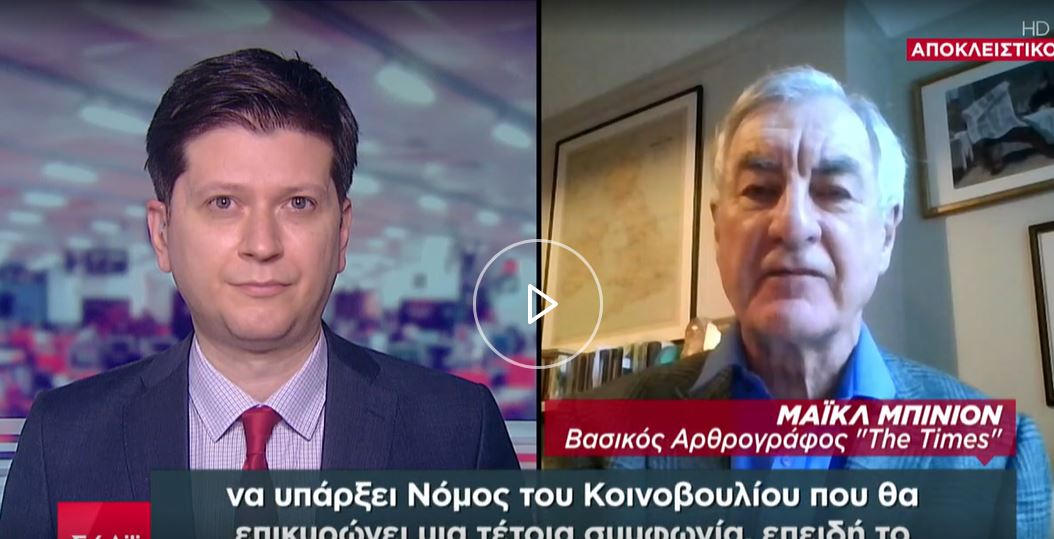The news in Greece exploded last night as a result of the Times leading article 'Uniting Greece's Heritage'. The article called the case for reuniting the sculptures from the Parthenon, a compelling one. The top evening news bulletin in Athens on Wednesday 12 January 2022 was made by SkaiTV with Michael Binyon speaking for The Times and Professor Paul Cartledge for BCRPM.
To view this news bulletin, follow the link here.

Thanasis Gavos, the UK Correspondent for SkaiTV Greece, has sent us the Q & A he reported on with Professor Cartledge:
Q: What is the significance of such an article in such a newspaper, which for many represented the views of the British establishment?
PC: To me it’s quite a surprise. The paper is one of our very oldest. It was founded in the 1780s, it has a circulation of about 400,000 per day and about 15 million per month. It is, as you says, a paper whose view are, shall we say, centre-right and they represent what one might call ‘the establishment’. So well-educated, university educated professional people typically who read it. And conventionally, my impression is, a lot of people with that background who read The Times actually favour the retention of the Marbles in the British Museum, for various reasons, partly legal, partly cultural. They don’t think they should go back. But, this second leader in The Times suggests to me that it is reflecting a groundswell of opinion, a real change, we might even say a sea change, in opinions.
And I think what started it really was the French claiming that they must now deal with the damage done by colonialism, by restoring the various French African territories’ artefacts. That of course brought into question the Benin Bronzes in Nigeria, which the British stole, no question about that. The Elgin question, the Marbles of the Parthenon, is a much more complicated issue, both legally and historically. Which is why the shift in opinion of The Times to me is both a surprise and a very welcome surprise.
Q: We can also read they accept the main moral argument, who many might say is THE main argument, that the Parthenon Sculptures are part of an artistic whole, therefore a unique case. Could we say now that this argument has been really well-establish in the British public opinion?
PC: I sincerely hope so. You put your finger on the most important point from our - that is the British Committee and the international Associations - point of view, which is that the Parthenon is a unique structure. The Greek government is not even asking for the return of the very famous Caryatid column from the Erechtheion. It’s a mistake to think that the Greek government want everything that Elgin took to be returned to Athens. The campaign is specifically for the Parthenon Marbles because as you say, of it’s unique status: still remaining on the Acropolis, of course in a ruined state, in visible sight of the New Acropolis Museum with its dedicated gallery aligned with the Parthenon and properly, we think, historically, scientifically properly displayed.
So we were very very happy that this leader, though wrongly used the phrase ‘Elgin marbles’ which is too broad, nevertheless put its finger on that key unique point - which of course therefore means that this particular case has no necessary implications for any other artefacts in the British Museum.
Q: Pressure is building, but how hopeful are you that at some point we will see the restitution of the Sculptures?
PC: I am hopeful but only in the longer term, for two reasons. One, we have not yet identified anyone in the current parliament or government who would be willing to stand up and campaign and propose the reunification. Secondly, the British government, like in Cyprus, like in Greece, has other more immediately pressing issues to face. When you make a parliamentary campaign to propose a measure, it takes an awful lot of time, and time is money. Therefore, you have to prioritise, and at the moment the Covid situation is so bad in this country that we still have no doubt a long way to go before the government can turn its mind to anything other than that, such as the Parthenon Marbles issue.

Thanasis Gavos, UK correspondent for SkaiTV Greece, with his story following on from The Times lead leader article published that morning, supportng the reunification of the Parthenon Marbles.

SkaiTV Greece, speaking with Michael Binyon of The Times